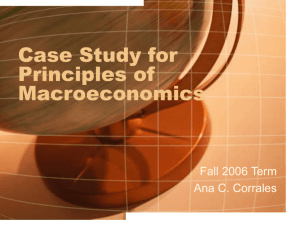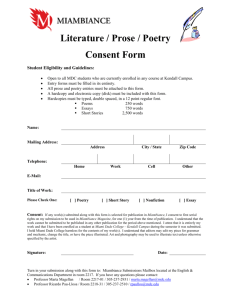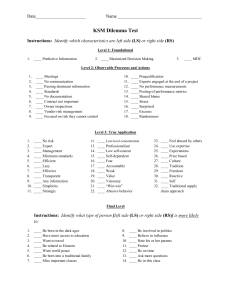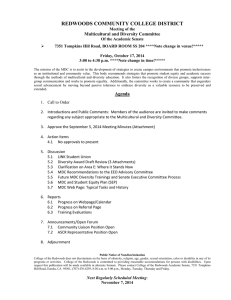Marketing the Community’s College (continued)
advertisement
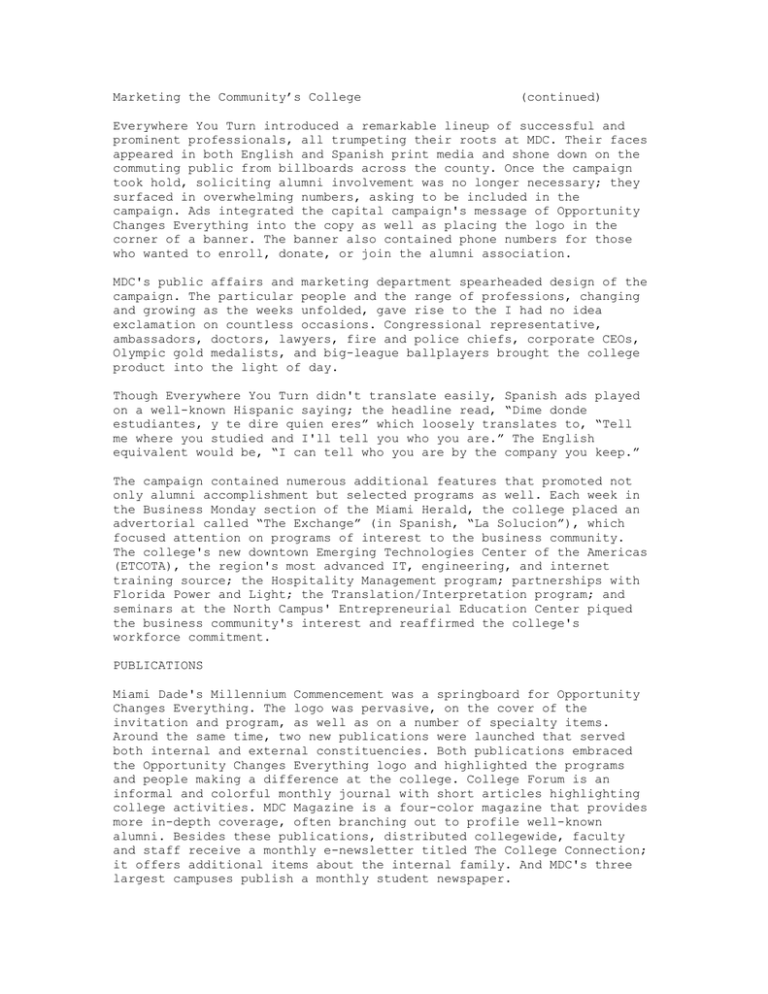
Marketing the Community’s College (continued) Everywhere You Turn introduced a remarkable lineup of successful and prominent professionals, all trumpeting their roots at MDC. Their faces appeared in both English and Spanish print media and shone down on the commuting public from billboards across the county. Once the campaign took hold, soliciting alumni involvement was no longer necessary; they surfaced in overwhelming numbers, asking to be included in the campaign. Ads integrated the capital campaign's message of Opportunity Changes Everything into the copy as well as placing the logo in the corner of a banner. The banner also contained phone numbers for those who wanted to enroll, donate, or join the alumni association. MDC's public affairs and marketing department spearheaded design of the campaign. The particular people and the range of professions, changing and growing as the weeks unfolded, gave rise to the I had no idea exclamation on countless occasions. Congressional representative, ambassadors, doctors, lawyers, fire and police chiefs, corporate CEOs, Olympic gold medalists, and big-league ballplayers brought the college product into the light of day. Though Everywhere You Turn didn't translate easily, Spanish ads played on a well-known Hispanic saying; the headline read, “Dime donde estudiantes, y te dire quien eres” which loosely translates to, “Tell me where you studied and I'll tell you who you are.” The English equivalent would be, “I can tell who you are by the company you keep.” The campaign contained numerous additional features that promoted not only alumni accomplishment but selected programs as well. Each week in the Business Monday section of the Miami Herald, the college placed an advertorial called “The Exchange” (in Spanish, “La Solucion”), which focused attention on programs of interest to the business community. The college's new downtown Emerging Technologies Center of the Americas (ETCOTA), the region's most advanced IT, engineering, and internet training source; the Hospitality Management program; partnerships with Florida Power and Light; the Translation/Interpretation program; and seminars at the North Campus' Entrepreneurial Education Center piqued the business community's interest and reaffirmed the college's workforce commitment. PUBLICATIONS Miami Dade's Millennium Commencement was a springboard for Opportunity Changes Everything. The logo was pervasive, on the cover of the invitation and program, as well as on a number of specialty items. Around the same time, two new publications were launched that served both internal and external constituencies. Both publications embraced the Opportunity Changes Everything logo and highlighted the programs and people making a difference at the college. College Forum is an informal and colorful monthly journal with short articles highlighting college activities. MDC Magazine is a four-color magazine that provides more in-depth coverage, often branching out to profile well-known alumni. Besides these publications, distributed collegewide, faculty and staff receive a monthly e-newsletter titled The College Connection; it offers additional items about the internal family. And MDC's three largest campuses publish a monthly student newspaper. HARVESTING AWARENESS For many public colleges and universities, the past several years have been a time of economic reckoning. True to form, the weak economy has delivered increased enrollment, and state legislatures have continued to slash allocations. In the learning business, with its increased cost per student, this is a roadmap to mediocrity. Conceding that the disparity was likely to grow worse, a more pointed message to MDC's constituencies was in order. While the Successful Alumni campaign had opened some eyes, there remained a disconnect between the excellence suggested by the college's alumni and the willingness to donate or enroll one's own children. It became obvious that MDC suffered from an image problem. The community seemed to take for granted the college's broad and enduring contribution. With the help of a South Florida advertising agency, the college once again set about addressing the dual challenges of image enhancement and funding. The campaign strived to reconcile contrasting components by marketing the college's excellence while stating the case for maximum public support. The message needed to convey that this level of excellence could not be sustained without increased public support. Call Us Essential – Call Us The College Call Us Essential – Call Us The College is a simple message that reminded the community of the institution's importance and provided a name reference that reinforced the college's essential role. Implementation rested on several promotional steps: Establish institutional identity, marketing the essential importance of the college and clarifying the excellence of its mission. 1. Use diverse media and creative messaging, a range of electronic, print, outdoor, and direct-mail media with varied messages for different constituencies; 2. Enhance relations with media. Beyond the daily stream of news releases, offer innovative storylines and develop new relationships with national media to support the quality recognition of the college. 3. Expand internal communications. Coordinate messages via electronic, print, and personal communication; use the branding concept to develop T- shirts, mugs, and other collateral materials. 4. Refine and enhance the college's web resources. Coordinate with the marketing campaign and provide specific pages for prime aspects of college functioning, serving internal and external constituencies. The campaign spoke to the breadth and quality of MDC's academic mission, the college's indispensable value to the community, and the college's limited resources and the imminent possibility that students would be turned away to preserve quality. Each aspect of the overall message needed to reach particular constituencies. Certainly, the message needed to connect with the general public on all points. Two-thirds of all households in the county enrolled a family member at some point in MDC's history. These were the people who might someday support a local revenue source. The notion of academic quality, confirmed by the new baccalaureate degree programs and the Honors College, needed to reach parents, teachers, advisors, and students. The fact that the college trained two-thirds of the county's nurses, all the firefighters, emergency medical technicians, and police officers needed to resound with the community's civic leaders. And corporate executives, who could steer substantial resources to the college, needed to recognize that a talented workforce began with MDC. Educating and influencing legislators is a central aspect of an institution's marketing responsibility. The same information capsulated in media promotions must find its way into appropriately formatted communications to those who influence the day-to-day operations of the college. As MDC reached out to educate its community, the institution remained mindful of persuading its Tallahassee and Washington contacts of pressing needs. Finally, MDC's internal community needed to embrace the message and feel the pride of ownership. After years of innovation and success, it was time for the teachers and learners to be fully recognized as difference makers in the community. Since MDC embarked on the campaign in late 2002, the trends in funding and enrollment in higher education have continued, intensifying the crisis facing colleges and universities in Florida and across the nation. The campaign has laid the groundwork for resource development that will be crucial in maintaining MDC's contribution to the community. Public colleges and universities must articulate breadth of their offerings and ensure that their appreciate that such excellence comes at a cost. realities of our time that marketing and funding partners. the excellence and various publics It is one of the are full-time As the vanguard of accessibility, public colleges and universities have become central to America's productivity and prosperity. The test now is to survive and flourish under the weight of success. Articulating the essential nature of these institutions is crucial to accomplishing this transition. Eduardo J. Padrón is President of Miami Dade College.
